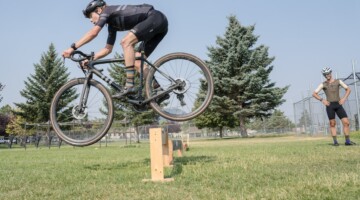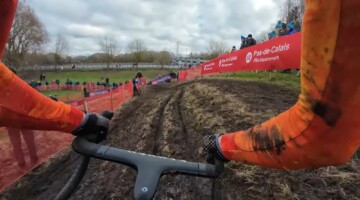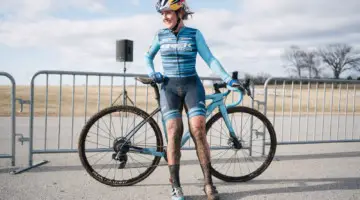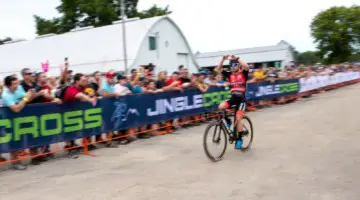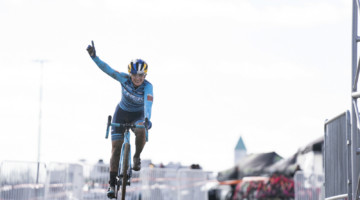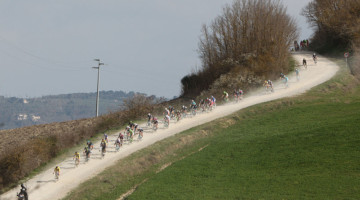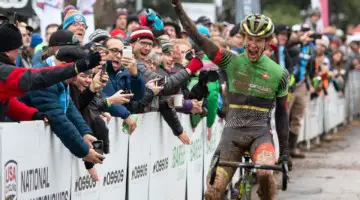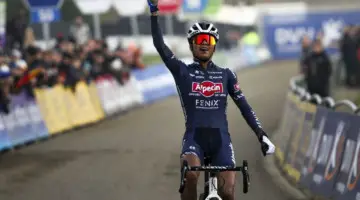“I’m not sure if next year’s Nationals is going to happen for me,” Jeremy Powers said in his 2018 Reno Nationals post-race interview with Cyclocross Magazine. For anyone who caught the statement in the din at the finish line after his second-place finish, it was certainly head-turning and likely produced a lot of questions.
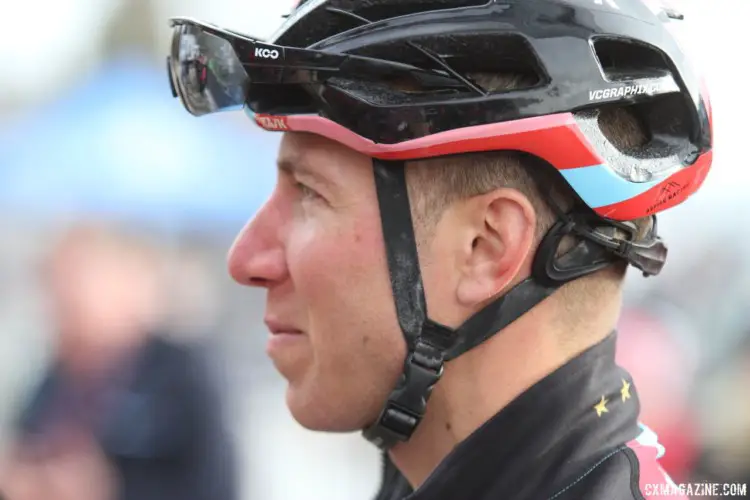
Jeremy Powers came to Reno looking to return to the front of U.S. cyclocross. 2018 Reno Cyclocross Nationals, Sunday. © D. Mable / Cyclocross Magazine
Those questions were answered, to some extent, in a statement on Powers’ Facebook page today. In the statement, Powers said that his Aspire Racing team will be ending after the Valkenburg-Limburg World Championships and his personal future in the sport is to be determined.
The news was a surprise for the U.S. cyclocross community. In just four seasons, Aspire Racing had joined programs such as Cannondale p/b CyclocrossWorld at the forefront of U.S. ’cross, and Powers himself had relationships with his two title sponsors Rapha and Focus that dated back to the beginning of the decade. The change is a big shake-up on the cyclocross landscape.
End of an Era for Powers
Powers began Aspire Racing in 2014 with Rapha and Focus as its main sponsors. His relationship with the two brands extends back to 2011, when he first joined the Rapha-Focus cyclocross team that also included Zach McDonald and Chris Jones.
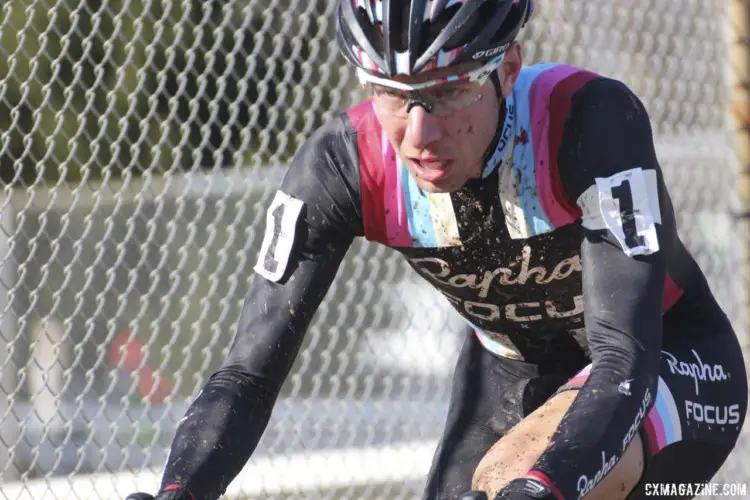
Powers raced with Rapha-Focus from 2011 to 2013 before starting Aspire Racing. © Cyclocross Magazine
After establishing himself with Aspire, Powers soon started to expand the team by signing top young talent, much as he did with the JAM Fund. The team added Ellen Noble to the roster in 2016 and then Spencer Petrov in 2017.
While the last two years were successful for Aspire, they have had their share of ups and downs for Powers himself. Powers and his wife Emily had a child, Finn, this past summer and he brought back his Behind the Barriers franchise with an “Aspire Racing Edition.” At the same time, he has struggled to recover from a rib injury suffered at the beginning of the 2016 season. We discussed the issues he has faced at length in our reflection on his battle against Stephen Hyde at the 2018 Reno Nationals.
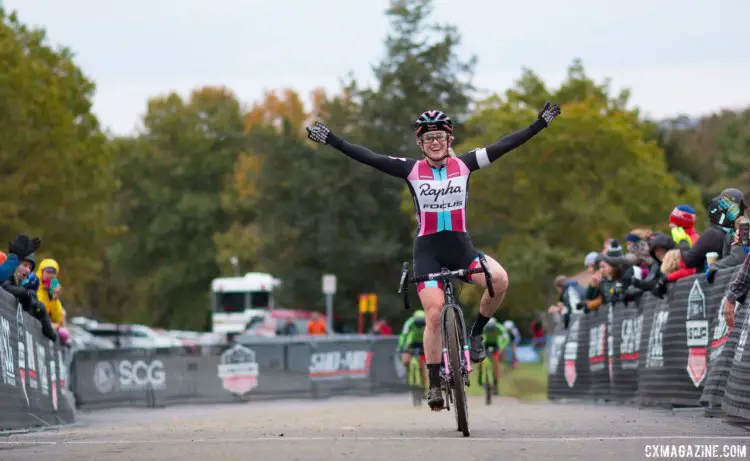
Ellen Noble has excelled as an Aspire rider. Elite Women, 2017 Cincinnati Cyclocross, Day 2, Harbin Park. © Cyclocross Magazine
The 2017 season brought heart issues, which came to a head at the Pan-American Championships. Powers revealed he had to withdraw due to a tachycardia, or rapid heart rate, during the race.
Despite everything going on, he found some time to head to New Mexico to train with his team before the Reno Nationals and came back to take Hyde down to the wire in a Nationals battle for the ages. Powers drove the pace for much of the race and nearly knocked Hyde off in the last half lap. It was after the race while speaking with Cyclocross Magazine he made the fateful comment that left us wondering about his future.
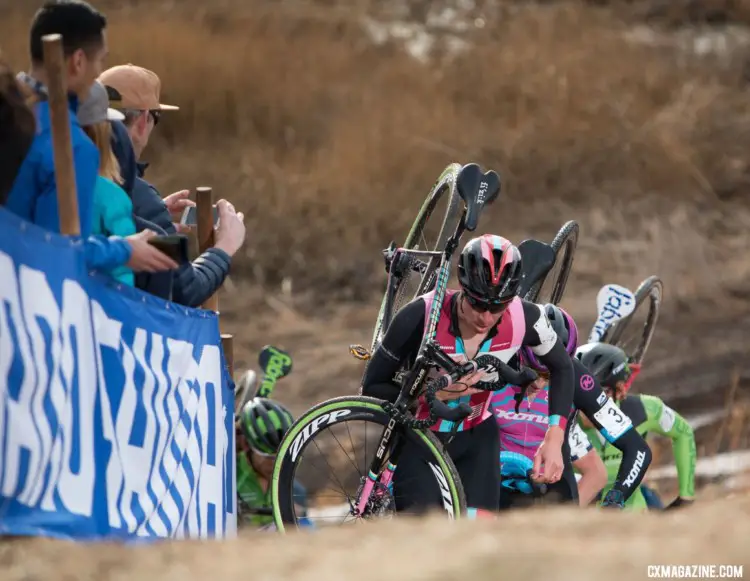
Powers had a strong second-place finish at the 2018 Nationals. 2018 Cyclocross National Championships. © A. Yee / Cyclocross Magazine
Jeremy Powers on Aspire Racing, His Future
After five sleepless days of reporting at the Reno Nationals, it took a few days for the gravity of Powers’ post-race statement to sink in for our team. Cyclocross Magazine‘s Andrew Yee reached out to Powers to ask him for more about his statement, “I’m not sure if next year’s Nationals is going to happen for me.”
Powers proved more on his statement about next year’s Nationals, the end of Aspire Racing, his health and his personal future in racing in this in-depth conversation.
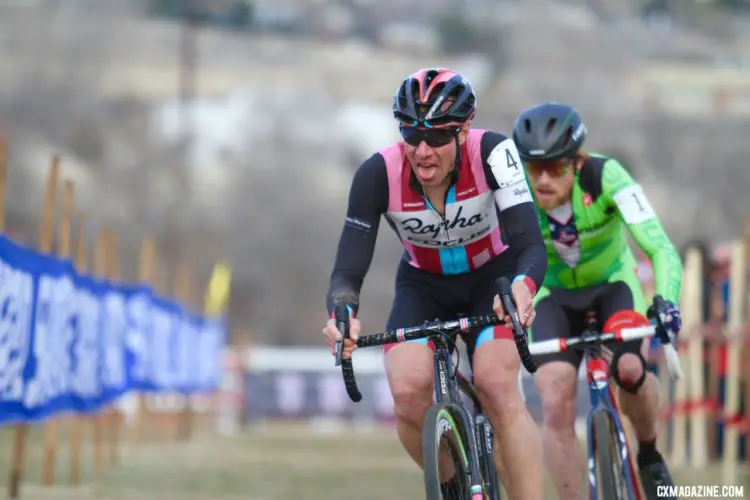
Cyclocross Magazine spoke with Jeremy Powers after the 2018 Reno Nationals. Elite Men, 2018 Cyclocross National Championships. © D. Mable/ Cyclocross Magazine
Cyclocross Magazine: In your interview with Cyclocross Magazine’s Dave Mable after Nationals, you said, “I’m not sure if next year’s Nationals is going to happen for me.” That obviously deserves a follow-up. So, here’s the follow up: what did you mean by that?
Jeremy Powers: The Aspire team unfortunately isn’t going to continue on for next year and so yeah, this was our last weekend as a full team with all of the staff and everyone together. This was that. We all had a dinner for that and we got together.
There’s a lot of reasons. Some of those reasons came up organically where sponsors were leaving and with sponsors leaving, it’s like, okay, we’ve got a hole in the boat and we need to plug the hole. But there’s like five or six holes and I’m saying, okay, well I need to plug all of these holes. And then you think, oh, the ship’s going down, you know, we might not have enough putty for this.
CXM: So this is about sponsors and finances?
JP: That’s one part of it. The traditional model is that American cyclocross teams is quite possibly the most expensive model that exists, because of everything that happens to go into it.
CXM: Because of all the travel involved? Flying to every race and then to Europe?
JP: Absolutely. All the travel and the variable costs to the programs that you can make a budget but the cost is very variable. That’s what I’m trying to say. And I think that that is different than someone in like a European program where if you study, the more you understand that there are some variable costs which include coming to the United States now. But in general those riders get a stipend or a budget and then they work off that with your family.
So it’s, you know, 100,000 dollars goes to Tom Meeusen, 100,000 dollars goes to this guy or 100,000 dollars goes to Klaas Vantornout or whoever it is. And then they all have their budget for the year and then they have their family and they had their friends and they get their camper for free. And so that is a much healthier model, right? Because everyone’s responsible for their budget. And that individuality I think is something that is really worth examining as the sport continues to grow.
I’m not trying to give you your story, I’m just trying to really set the tone for what I think is almost an archaic system of sponsorship and the way it’s run because we’re running these traditional teams that are sort of third-party teams, you know, Rapha Focus, right? The privateer programs are really the way of the future.
And almost all of the cyclocross programs are privateer programs now. If you look, there are very few that aren’t. There’s Cannondale CyclocrossWorld, Aspire Racing, Donnelly, you know, that model is very American. It’s based around like the old-school mountain bike stuff, which I truthfully believe is dying.
I’ve been tuned into that for a while and I’ve been thinking and trying to rethink the way that this team could run and operate in a more efficient way, but really because of the way that it’s set up and the DNA and the formula of the program, it just doesn’t work. It was never the way I knew it and it’s never the way that it made sense and I didn’t think that the riders would have success because part of the problem, I think, is they need that support and they need that person doing the logistics for them and the only thing they do is show up.
And so that’s the thing I know. And I think that the reason that I say, will this be my last Nationals is because I don’t have the support to go forward, at least in full. I’ve let everyone on the team know that it can’t continue on. That’s so I don’t hurt anyone else, you know what I mean? I’m being transparent with them because I haven’t been able to raise the funds since then. It was November when I found out that this was going to start to look like this and started to take shape.
I don’t think we had bad results, I just think that with cyclocross, cycling with teams, it’s just an ebb and a flow. It’s hot, it’s cold, right? Ellen and Spencer and I, we all had great results and some of them were at the beginning and some of them were at the end, but when it hit and when you’re asking for the sponsorship, it was a unique time and I think all of that was hard to get over. So we’re not winning everything and we’re asking for support and it’s a big number to support the team because it’s because of this model that we’re using.
CXM: Do you ever wonder if you set too high of a standard in your two-year dominant string of racing where you won almost everything? It’s so hard to match that, repeat that, top that.
JP: Yeah, I do. I think I also benefited. I think about the list of sponsors that we had and how beautiful that was. Some of the most incredible brands, not only industry, but some of them out in the world sponsoring us. BMW and Oakley and Rapha, we created a lot of partners. I mean it was just so, so special to have that access and to be given that level of support from people who believed in what we were doing. I can never ever forget that my dominance obviously opened those doors, but on the other side, I think it does hurt the racing a little bit in terms of the interest. Now I reflect and I think man, that was such a beautiful time.
When I felt like I was having some success, I could say, oh I can help some other people and help the sport. That’s always my idea. Then with the team I was like, Oh, I’m doing well and like I have a lot of support so I could probably help Ellen because she doesn’t have anywhere to go and we need to get her going. And then Spencer.
I think that a lot of this loss of sponsorship is coming from that over-extension where I’ve just kind of kept going and going. And that wasn’t maybe the original vision because a lot of these deals were signed on the back of my racing and my success without the team being the major focus, you know, if that makes sense.
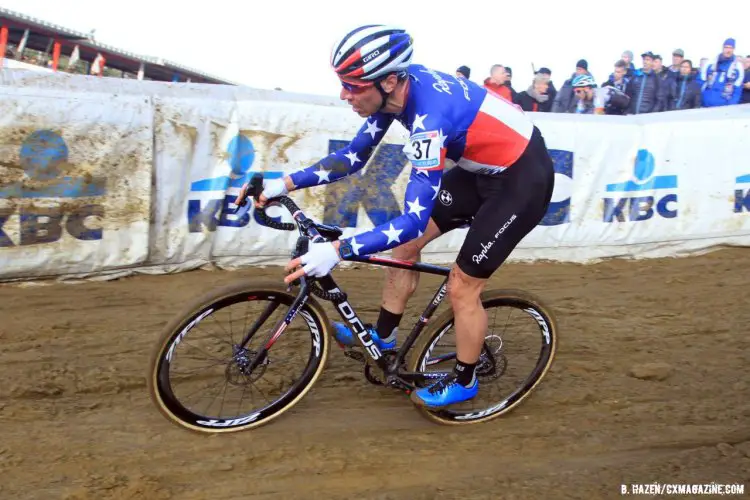
Powers has established a high standard for success in U.S. cyclocross. 2015 World Cup Zolder. © Bart Hazen
CXM: So just so I’m clear though, when we interviewed you after Nationals and you kind of dropped that little nugget that it could have been your last, it’s all tied into the team and sponsorship and not related to your heart issues at all?
JP: Right.
CXM: So the heart is all good?
JP: Yeah. I’ve been given the all-clear that my heart problem, the tachycardia, the supraventricular tachycardia is a very benign, extremely benign thing. And the amount of times I’ve had it, they didn’t feel like it was necessary to do the procedure, although I was offered to do the procedure and especially if the frequency kicks back up. But I’ve trained very hard now, which has given me a lot of confidence. When I trained it was really, really hard, but in a more controlled environment. But then I had raced several times and had even won Rhode Island and stuff like that, so I was able to kind of kick the fear of it happening again out and do good races again.
So yeah, the heart is not at all the front burner, although of course if it starts I will need to get the procedure done. But with the procedure, you can in theory go home that night.
“When I felt like I was having some success, I could say, oh I can help some other people and help the sport. That’s always my idea.”
CXM: And that’s not playing any role in your sponsors’ decisions as to whether they support the team or you in the future?
JP: I don’t think so. I think with some of the sponsors, it’s just run its course. I think a lot of these companies have changed directions since we originally did this. All of them are so amazing and they’re all great people and I’m not angry at all. I mean that completely honestly and totally straight forward. I think it was so beautiful and I feel so lucky to have had the support and all the sponsors have just helped me get to this place and let me see this training fully for myself and for a lot of other people as well.
It’s not just the team in this, the staff and the riders. There’s also all the projects and great stuff we did that they helped me and allowed me to do. Of course, they benefited, but I think when people think, oh, sponsors leaving and they get upset, but really for me, it’s not at all like that.
CXM: Are you at liberty now to say which sponsors are pulling out? Is it Rapha or Focus or just or one of them?
JP: Yes, Both Rapha and Focus which were our title sponsors were set to end in March of 2018, but the partnerships are ending on good terms. Rapha and Focus have left for different reasons, I have no ill will or bad blood in anyway. I’m grateful for all of their support, I have friends at both companies and I consider them both to be incredible brands and I’m humbled I got to work with them for this long.
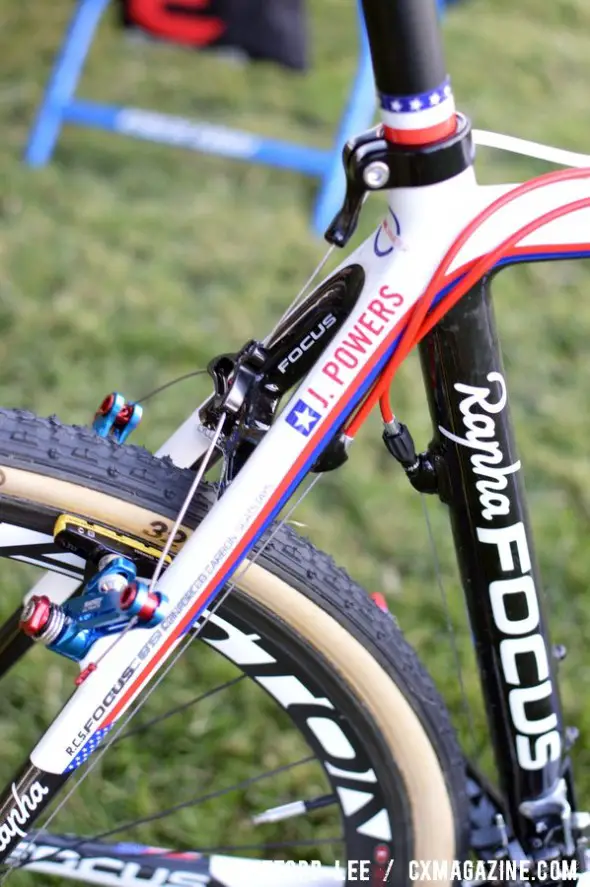
Powers’ relationship with Rapha and Focus goes back a long time. The new team bike for National Champion Jeremy Powers. © Cyclocross Magazine
CXM: You had such an amazing Nationals, it felt like you were just felt like inches away from a fifth title, which would tie the all-time Elite Male record [by Laurence Malone]. That’s got to give you a ton of confidence that you can compete at the highest level for at least a few more years, right? Does that play a role into your motivation to, you know, scrape together whatever sponsors you can just to continue racing or have you reached a certain level of prominence and compensation that makes it too hard to put together a privateer program?
JP: There are two parts to that. I think, one, I do also feel I have something to add to the racing and I do still have a part of me that is very passionate about the racing. But the health stuff has been very real for me. I feel like through my whole career I’ve always battled the small things but the last year, whether it was with a back injury or whether it was my ribs or whether it was with my heart, those things were bad enough that I had to say something. But I think cyclocross is such a hard sport and it is very hard and your body.
And like I said to you, I think my checklist is, is really full. I really feel like I did do the things that I wanted to, but sometimes I do ask myself, like when we’re doing a double weekend, I do find myself asking those questions, is this the best use of my time and do I have the passion to be here?
It’s also kind of combined with owning and running the team and fighting for the sponsorship and maintaining the relationships. It’s so much work and as my life has changed, even running the show and working with the producers and the videographers and booking the tickets, there’s so much that goes into a team and it’s not that I’m doing all of it, but I’m responsible for all of it.
“…sometimes I do ask myself, like when we’re doing a double weekend, I do find myself asking those questions, is this the best use of my time and do I have the passion to be here?”
CXM: That’s something I can certainly relate to. Juggling too much.
JP: Yeah, for sure. It’s not for the faint of heart. And I think when I look back and I look at the results and the way that they’ve gone since I started the program, there’s a really clear decline in my results as I started to spread myself thin. And this is a historical pattern with myself. If I look back when I started Behind the Barriers, I can look at my results and see them go down.
And it really comes from the financial burden. You know, it’s really hard and I can’t stomach it. Like, I’m entrepreneurial to a certain extent, but I know my limitations. I have enough self-awareness to know that when I’m under pressure, it’s not fun. I don’t enjoy that type of stress.
I think that’s a really big thing along with having our son and that dynamic changing. It’s really important that I shift my focus towards myself and towards what I did do to make it if I want to continue on. What is going to get me to the race with a full tank of energy and enthusiasm and excitement for what I’ve put into it? What goes into the training, what goes into everything.
I was talking with Todd Wells about this a little bit and he said something that I think is so true. He said, “When cycling is going well, there isn’t a better thing that’s going,” and I could not utter better words than he did. It’s so true. There’s just nothing better than this sport or this lifestyle or the things that you do when you’re in a good place and the results are good and the sponsors are happy and you’re happy. It’s the best.
But when there’s something out of sync, it can be very challenging, whether it’s an injury or financial hardship or sickness, whatever. It’s just all those things can derail an athlete or just add to the mental aspect, which, if your mental game isn’t right, then it just makes it so much more difficult for sure.
“When cycling is going well, there isn’t a better thing that’s going.”
CXM: Before this team and before fatherhood and all that, did you have an ideal age of retirement in mind?
JP: Well, I always knew my contracts ran out this year. I signed everything in to go through this 2018 season and so I always thought I would reassess at that point. I always thought, we’ll see how things are going and we’ll see what’s happening.
But I can also say that when I was dominant, I felt like I was getting, I don’t know, status quo. Everything was just so simple. And I think psychologically we like a little chaos. We added Ellen and then when we added Spencer too, then we’re like, oh, we need another mechanic and then we need all these things and I know sometimes it just starts to go awry.
You’re like, well I’ve given up on my ambitions a little bit because the team is so important and these other people’s lives mean so much to me. That’s powerful. And I felt that with the various TV projects as well. It was like a totally different thing, but it had a lot of same properties involved because I put them in the same. This is probably the time that I will absolutely say this as my Ph.D. of knowing myself really well now. If my bachelors was Behind the Barriers, my Ph.D. is Aspire. For sure.
“The team is so important and these other people’s lives mean so much to me. That’s powerful.”
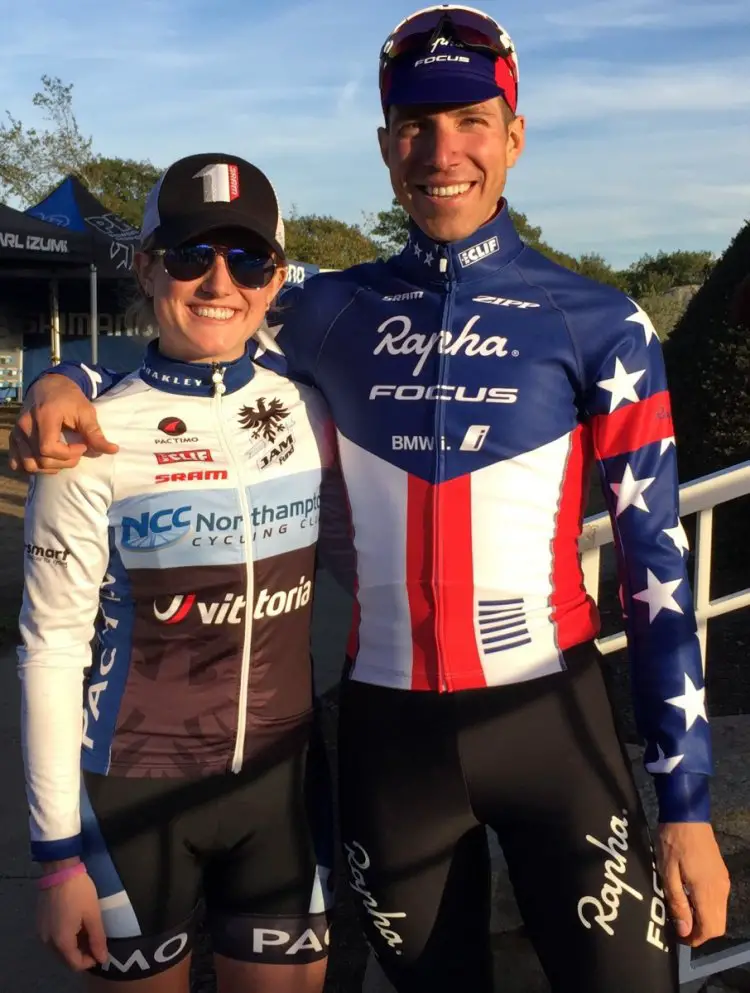
Jeremy Powers, owner of Aspire Racing, announced today the expansion of his program with the signing of Ellen Noble for the 2016-17 cyclocross season.
CXM: That’s a Ph.D. with all kinds of honors because you’ve accomplished so much. A successful education at least. In contemplating retirement, do you have other leads or other ideas on what you would do instead of racing next season?
JP: I think I’m really trying to, that’s what I’m doing now. I want to do something in cycling and I want it to be cool and fulfilling and fun. All those things. Really looking at what the opportunities that will be out there and available. I feel really confident in a year I will have something cool, impactful and fun. But I might also have an ice cream shop in town. I really have no idea … don’t back me into the corner!
CXM: Almost winning Nationals a couple of days ago, would that have changed anything in terms of either your commitment to totally show off the jersey and continue in another season or even your sponsors’ perspectives? Maybe they’d be like, hey, we have a chance to have our name on the National Championship jersey. We’ll sign on for another year.
JP: That absolutely had nothing to do with my performance. I wanted to prove that to myself straight up. That’s it. And I mean that as absolutely, intensely seriously as I possibly can. That it has nothing to do with my situation.
I truly believe that if I will be able to get the sponsorships towards another year, then I have a good enough brand and I have done enough that I will get some support. I mean that in the least pompous or cocky way as absolutely possible. I do think that there will be someone who’s like, yes, we can support this and we make it viable and we think it’s a good use of our marketing budget.
CXM: It’s still your decision you’re saying.
JP: Yeah, I think if it’s there and I can put it together and it doesn’t take me until July. I would really like to look at things in March. That’s kind of my thing, like okay, if I can put something together good by March because I have all of these that run through basically the end of February. And so once that’s over, then we’ll look at everything and we’ll see what we have. I’m going to put out a lot of feelers to that as well. I think that will start to get things coming back.
So I wasn’t riding for a contract. Because I’ve had a lot of injuries and because I’ve let the team go, there’s a lot less stress in my day. I told the team after Texas like, hey guys, this is what’s happening and I’m really sorry, but this is how it’s going to go. Because I’ve got that off my chest and because I’ve gotten rid of that stress of having to worry about these people I have in the program and their jobs and they’ve been able to search for things, that has helped me immensely in being able to decompress and let go of all that. It allowed me to open up the training and get that weight off my shoulders
CXM: Regardless of the placing on Sunday, it wouldn’t have changed how you felt going forward?
JP: No. I would’ve loved to have won again for myself. If I had won, I would have been totally comfortable stopping and I would have been totally pumped to keep going and I don’t think it would have influenced the decisions of the sponsors. My belief is that their directions have changed and that these sponsorships have run their course to a certain extent.
I think you could argue we had excellent coverage and we did great work for all of the sponsors that we had because we were getting results. Whether it was with me, Ellen or Spencer, we had great stories and then we did good work. I don’t think there was anything more I could have done. From an organizational standpoint, I think we’ve put on a good footprint and I think we keep everyone up to date. I know we do. So I don’t look at it as like, oh, you didn’t do something good, you know, it’s your fault. It’s just not like that. It’s marketing and if I was in marketing, I would be looking at those same factors.
Like I was saying at the beginning of this conversation, it has changed so much with the advent of social media. It’s obviously changed, and it’s on full blast right now with the amount of attention they can get and the analytics and the data that they get from what we’re doing. I think it influences decisions. Along with the cycling market, our community is just not doing phenomenally. All of those things are factors in what’s happened.
CXM: With Ellen and Spencer there, I guess they’re currently looking for another program for next year?
[Ellen will make an announcement after Worlds. -Ed.]
JP: Spencer will need to find a place. I always think that there will always be a place for him on the JAM Fund, which is not what he wants to do, but it’s a level of support that we could give to him pretty quickly and I could easily help him. I think Spencer will have a different offer and I think that he has enough results at his age of 19 that he will have a great offer, but it just won’t be on my plate. I hope Spencer will live in this area so we can help mentor him and keep him in the community because he has an incredible personality and he’s got a really bright future.
I believe in Spencer and that’s exactly why he’s on the team. I enjoy him as a person as much as anything else.
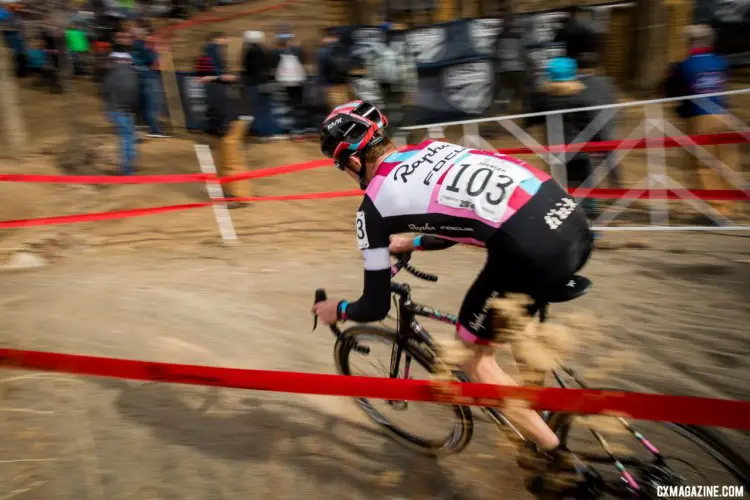
Spencer Petrov had a successful season with Aspire this year. 2018 Cyclocross National Championships. © J. Curtes / Cyclocross Magazine
CXM: Can you ever imagine racing into your forties like Jonathan Page and Katie Compton have done and competing for podiums at Nationals?
JP: No. I think I went really hard. That’s just my personality. Like I want to like do it all. Patience is not my strongest suit. I want to just like crush it on everything. Train this way, train that way, go out and get fast quick and all that.
Cycling is not like that. It takes an extreme amount of patience, which has been the number one thing that I’ve learned about myself. I need more patience. Just look at my race on Sunday. It was take no prisoners we’ll just see who’s left and then we’ll deal with the rest. It’s like that’s my mentality, there isn’t a lot of patience. Maybe patience is the wrong word. It’s more excitement. Like I just get so excited that I’m like, I gotta go, I gotta do all these things.
So I don’t think so, but I do think I’ll be a part of the sport into my forties and I think that the programs and the things that we’ve done will still be here.
CXM: You had some patience. You had some near wins at Nationals for a while and then turned it into dominance we’ve never seen in this era.
JP: Right. I agree. It’s funny, I tell Spencer and Ellen, just remember it took so long for me to win a national title. I never won one as a Junior. I didn’t win as a U23 and it took me six years when I was a pro. I was in a position to win them multiple times. I’ve tried to give them that perspective because I know how much it hurts those guys. “I’m trying so hard. I’m giving it a hundred percent and it doesn’t happen.” It takes so long.
CXM: Thanks so much for the time and chat. We hope to see you racing next season.
JP: Thank you so much.
Zachary Schuster and Andrew Yee contributed to this report.

